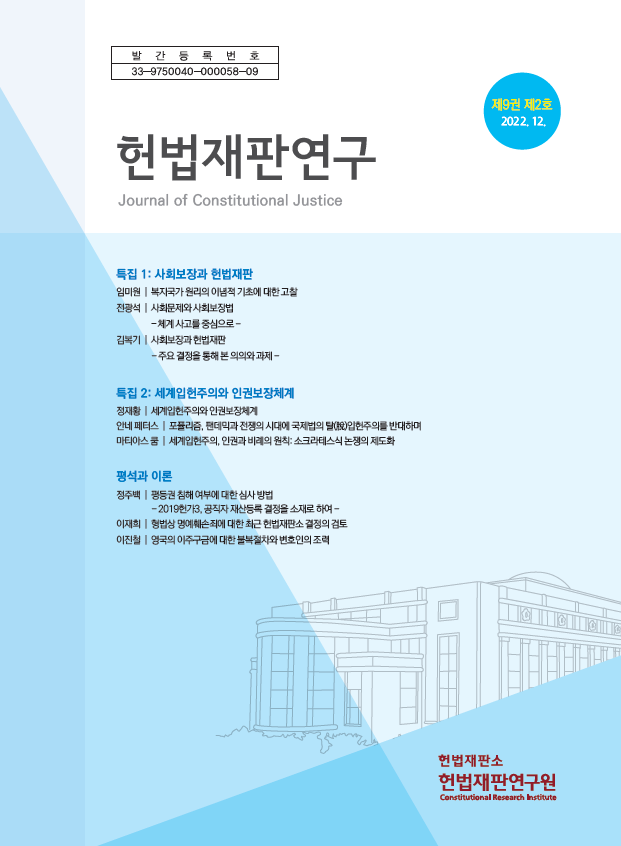학술논문
평등권 침해 여부에 대한 심사 방법 - 2019헌가3, 공직자 재산등록 결정을 소재로 하여 -
이용수 0
- 영문명
- A Question on the Method of Screening for Violation of Equal Rights - Analysis of 2019Hunka3, Public Service Ethics Act Case -
- 발행기관
- 헌법재판연구원
- 저자명
- 정주백(Jeong, Joobaek)
- 간행물 정보
- 『헌법재판연구』제9권 제2호, 289~323쪽, 전체 35쪽
- 주제분류
- 법학 > 법학
- 파일형태
- 발행일자
- 2022.12.28
무료
구매일시로부터 72시간 이내에 다운로드 가능합니다.
이 학술논문 정보는 (주)교보문고와 각 발행기관 사이에 저작물 이용 계약이 체결된 것으로, 교보문고를 통해 제공되고 있습니다.

국문 초록
혼인한 등록의무자 모두 배우자가 아닌 본인 집안의 재산을 등록하도록 공직자윤리법이 개정되었음에
도 불구하고, 개정 전의 공직자윤리법 조항에 따라 이미 배우자 집안의 재산을 등록한 여성은 종전처럼
배우자 집안의 재산을 등록하도록 규정한 공직자윤리법 부칙조항이 위헌이라는 결정을 하였다. 2009헌
가3. 이 결정의 내용을 검토해 보기로 한다.
우선 2007년 개정 전의 공직자윤리법은 입적한 家의 재산을 등록하도록 정하고 있을 뿐인데, 이를 남
녀차별적인 규율이라 보는 것은 이해하기 어렵다. 물론, 당시의 민법이 원칙적으로 아내는 남편의 家에
입적하도록 정하고 있었다. 이 조항이 남녀차별적인 것은 분명하다. 그렇다고 하여 문면상 중립적인 공직
자윤리법 조항이 남녀차별적인 것으로 이해될 수는 없다.
2007년 개정된 공직자윤리법은 혼인한 등록의무자는 모두 배우자 집안의 재산을 등록하도록 규정하
고 있었는데, 이것이 입법상의 실수인 것은 분명하다. 그런데 행정부에서 남편은 자기 집안의, 아내는 남
편 집안의 재산을 등록하도록 지침을 마련하였다고 하여 이를 법률의 내용으로 이해하는 것은 곤란하다.
이 사건에서 문제된 부칙조항이 다른 처우를 하는 기준이 되는 요소가 무엇인지에 대한 분석을 하지
않고 단지 두 개의 집단에 대한 다른 처우가 있음을 확인하고 바로 평등 심사에 나아갔다. 이는 헌법 제
11조 제1항의 심사구조로 타당하다고 할 수 없다.
이 사건에서 차별의 시정에 불편함 또는 불이익이 따르더라도 이것이 평등권 침해를 판단하는데 영향
을 미치지 않는다고 판시한 것은 이론상 무척 중요하다. 기존 판례에서 간과되었던 중요한 논점이다. 평
등은 이익의 회복을 도모하기 위한 권리가 아니다.
헌재는 심사 기준을 선택하는 단계에서 남녀차별이 어떻게 작용하는가에 대해 필요한 정도의 분석을
하지 아니하였다. 기존의 판례는 성별이 엄격한 심사기준을 선택하는데 영향을 끼치는 요소가 아니라고
보았는데, 이 결정에서는 다르게 보고 있다.
영문 초록
Even though the Public Service Ethics Act had been amended to stipulate that
all married individuals liable for registration were to register the property of their
own families (i. e., lineal ascendants and descendants), not of their spouses’ families,
a clause in the Addendum in the Public Service Ethics Act stipulated that women
who had already registered the property of their spouses’ families in accordance
with a clause in the pre-amendment Public Service Ethics Act were to register the
property of their spouses’ families, as previously. The Constitutional Court of Korea
(CCK) presented the decision that the clause in the Addendum was unconstitutional
(2019Hun-Ka3). The contents of this decision will be reviewed.
First, although the Public Service Ethics Act before the 2007 amendment had only
stipulated that individuals were to register the property of families in whose family
registers their names had been entered, seeing this as a sexist regulation is difficult
to understand. Of course, the South Korean Civil Act at the time had stipulated that,
in principle, wives were to have their names entered in the family registers of their
husbands’ families. This clause clearly was sexist. Nevertheless, the clause in the
Public Service Ethics Act, which was textually neutral, cannot be understood to have
been sexist.
The Public Service Ethics Act amended in 2007 stipulated that all married
individuals liable for registration were to register the property of their spouses’
families, and this clearly was a legislative mistake. However, understanding the
guideline prompting husbands and wives to register the property of their respective
spouses’ families as a content of the law merely because the executive branch
prepared it is problematic.
Without conducting an analysis of the elements that had served as the criteria
by which the Addendum clause problematized in this case had implemented disparate
treatment, the CCK only confirmed the existence of disparate treatment of the two
groups and directly proceeded to judicial reviews of equal protection. Based on the review structure in Article 11(1) of the South Korean Constitution, this cannot be
seen as having been valid.
Very important theoretically in this case is the ruling that even when the correction
of discrimination was accompanied by inconvenience or disadvantages, this did not
affect the determination of infringements on equal rights. This is an important point
overlooked in existing precedents. Equality is not a right for promoting the recovery
of benefits.
At t he s tage of selecting the review c riteria, the CCK d id n ot c ondu ct, to the
necessary extent, an analysis of the ways in which gender discrimination operated.
While existing precedents had seen gender not as an element affecting the selection
of strict review criteria, this decision viewed the matter otherwise.
목차
키워드
해당간행물 수록 논문
- [특집1] 사회문제와 사회보장법 – 체계 사고를 중심으로 –
- [특집1] 사회보장과 헌법재판 - 주요 결정을 통해 본 의의와 과제 -
- [특집1] 복지국가 원리의 이념적 기초에 대한 고찰
- 평등권 침해 여부에 대한 심사 방법 - 2019헌가3, 공직자 재산등록 결정을 소재로 하여 -
- [특집2] 세계입헌주의와 인권보장체계
- 형법상 명예훼손죄에 대한 최근 헌법재판소 결정의 검토
- 영국의 이주구금에 대한 불복절차와 변호인의 조력
- [특집2] 포퓰리즘, 팬데믹과 전쟁의 시대에 국제법의 탈(脫)입헌주의를 반대하며
- [특집2] 세계입헌주의, 인권과 비례의 원칙: 소크라테스식 논쟁의 제도화
참고문헌
관련논문
법학 > 법학분야 BEST
- 인공지능 판사, 과연 가능한가?
- 정치의 사법화와 사법의 정치화 : 온건하고 실용적인 헌법재판의 당위성
- 자국 우선주의 정책과 국제법상 난민⋅이민자 보호-트럼프 행정부의 미국 우선주의를 중심으로-
법학 > 법학분야 NEW
더보기최근 이용한 논문
교보eBook 첫 방문을 환영 합니다!

신규가입 혜택 지급이 완료 되었습니다.
바로 사용 가능한 교보e캐시 1,000원 (유효기간 7일)
지금 바로 교보eBook의 다양한 콘텐츠를 이용해 보세요!



